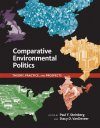![Comparative Environmental Politics Comparative Environmental Politics]()
Click to have a closer look
About this book
Customer reviews
Biography
Related titles
About this book
How do different societies respond politically to environmental problems around the globe? Answering this question requires systematic, cross-national comparisons of political institutions, regulatory styles, and state-society relations. The field of comparative environmental politics approaches this task by bringing the theoretical tools of comparative politics to bear on the substantive concerns of environmental policy. This book outlines a comparative environmental politics framework and applies it to concrete, real-world problems of politics and environmental management.
After a comprehensive review of the literature exploring domestic environmental politics around the world, the book provides a sample of major currents within the field, showing how environmental politics intersects with such topics as the greening of the state, the rise of social movements and green parties, European Union expansion, corporate social responsibility, federalism, political instability, management of local commons, and policymaking under democratic and authoritarian regimes. It offers fresh insights into environmental problems ranging from climate change to water scarcity and the disappearance of tropical forests, and it examines actions by state and nonstate actors at levels from the local to the continental. The book will help scholars and policymakers make sense of how environmental issues and politics are connected around the globe, and is ideal for use in upper-level undergraduate and graduate courses.
Customer Reviews
Biography
Paul F. Steinberg is Associate Professor of Political Science and Environmental Policy at Harvey Mudd College and the author of "Environmental Leadership in Developing Countries: Transnational Relations and Biodiversity Policy in Costa Rica and BoliviaM".
Stacy D. VanDeveer is Associate Professor in the Department of Political Science at the University of New Hampshire and the coeditor of "Changing Climates in North American Politics: Institutions, Policymaking, and Multilevel Governance".











































